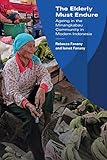The Elderly Must Endure : Ageing in the Minangkabau Community in Modern Indonesia / Rebecca Fanany, Ismet Fanany.
Material type: TextPublisher: Singapore : ISEAS Publishing, [2019]Copyright date: ©2019Description: 1 online resource (309 p.)Content type:
TextPublisher: Singapore : ISEAS Publishing, [2019]Copyright date: ©2019Description: 1 online resource (309 p.)Content type: - 9789814818469
- 9789814818476
- Aging -- Indonesia -- Sumatera Barat
- Aging -- Indonesia
- Minangkabau (Indonesian people) -- Social conditions
- Minangkabau (Indonesian people) -- Social life and customs
- Older people -- Indonesia -- Social conditions
- Older people -- Indonesia -- Sumatera Barat -- Social conditions
- Older people -- Indonesia -- Sumatera Barat
- SOCIAL SCIENCE / Ethnic Studies / General
- 305.2609598/13 23
- HQ1064.I5 F36 2019
- HQ1064.I5 F363 2019
- online - DeGruyter
- Issued also in print.
| Item type | Current library | Call number | URL | Status | Notes | Barcode | |
|---|---|---|---|---|---|---|---|
 eBook
eBook
|
Biblioteca "Angelicum" Pont. Univ. S.Tommaso d'Aquino Nuvola online | online - DeGruyter (Browse shelf(Opens below)) | Online access | Not for loan (Accesso limitato) | Accesso per gli utenti autorizzati / Access for authorized users | (dgr)9789814818476 |
Frontmatter -- Contents -- Acknowledgements -- Map of Indonesia -- Map of West Sumatra -- Map of the Village of Koto -- Aminah's Family Tree -- 1. Introduction -- 2. Ageing in the Past and Present -- 3. Adat Traditions and the Elderly -- 4. Religion and the Elderly -- 5. Language and the Elderly -- 6. Ageing in the Village -- 7. Ageing in Padang -- 8. Ageing in the Rantau -- 9. Ageing in an Institution -- 10. Ageing and Cultural Consonance -- 11. The Elderly Must Endure -- Afterword -- References -- Index -- About the Authors
restricted access online access with authorization star
http://purl.org/coar/access_right/c_16ec
Since its independence in 1945, Indonesia has experienced decades of rapid social change that have affected every area of life and have reached even the most remote parts of the country. The impact on the experience of the population has been equally significant, especially for those individuals who are over the age of 60 today and have lived through much of this period. This book concerns older members of the Minangkabau ethnic group, one of Indonesia's many local cultures. The Minangkabau have an ancient matrilineal social structure that is embodied in their local law and customs (adat) and that, in the view of many Minangkabau, is under increasing pressure in the modern context. Today's older Minangkabau are deeply affected by these challenges to the traditional way of life which relate to fundamental social patterns, such as the nature of the long-established tradition of leaving their region of origin to work elsewhere (marantau) and the structure of relationships within the extended family, as well as the potential value of traditional practices in modern society. The gap between their expectations that were formed early in their life and the realities of life in modern Indonesia often create serious problems of cultural consonance that represent a personal challenge for which there is no precedent and no established strategy to address. This book is based on a long-term study of older Minangkabau in modern Indonesia with a focus on cultural consonance. It profiles the members of one family from a village in the highlands of West Sumatra whose members now live in cities across Indonesia as well as in their village of origin. The challenges but also the opportunities experienced by these individuals, and members of the older Minangkabau population in general, are characteristic of similar social change experienced across Indonesia in recent decades and illustrate the nature of culture shift in the rapidly urbanizing and modernizing context of modern Indonesia.
Issued also in print.
Mode of access: Internet via World Wide Web.
In English.
Description based on online resource; title from PDF title page (publisher's Web site, viewed 24. Aug 2021)


